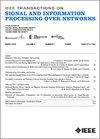Finite-Time Performance Mask Function-Based Distributed Privacy-Preserving Consensus: Case Study on Optimal Dispatch of Energy System
IF 3
3区 计算机科学
Q2 ENGINEERING, ELECTRICAL & ELECTRONIC
IEEE Transactions on Signal and Information Processing over Networks
Pub Date : 2024-11-06
DOI:10.1109/TSIPN.2024.3485480
引用次数: 0
Abstract
Privacy-preserving consensus can address the information being leaked during distributed computing, encouraging its application in various scenarios. This paper investigates the finite-time privacy-preserving distributed optimal dispatch for energy systems (ESs). Firstly, a dynamic output mask function is designed to ensure that each node's internal state cannot be identified while accomplishing a distributed task. Second, two finite-time privacy-preserving consensus algorithms are presented, including leader–follower and average consensus algorithms. Under the proposed dynamic mask function, the proposed algorithms are local, allowing each node to protect its privacy by adopting the proposed dynamic output mask. The superiority of the proposed algorithm lies in its ability to achieve precise convergence while ensuring privacy protection. Third, the accurate value of the target state can be obtained after finite steps when processing and transmitting information. In addition, several conditions are presented for ensuring the convergence of the algorithms, which is not limited by special topologies such as undirected graphs and balanced graphs. Finally, an application that achieves the distributed optimal dispatch for the CCHP-based (Combined Cooling, Heating, and Power) ESs, and two examples illustrate that the algorithms can be effective access to economic optimization and excellent privacy performance.基于有限时间性能掩码函数的分布式隐私保护共识:能源系统优化调度案例研究
隐私保护共识可以解决分布式计算过程中的信息泄露问题,从而促进其在各种场景中的应用。本文研究了能源系统(ES)的有限时间隐私保护分布式优化调度。首先,设计了一个动态输出掩码函数,以确保在完成分布式任务时无法识别每个节点的内部状态。其次,提出了两种有限时间隐私保护共识算法,包括领导者-跟随者共识算法和平均共识算法。在提议的动态掩码函数下,提议的算法是局部的,允许每个节点通过采用提议的动态输出掩码来保护自己的隐私。拟议算法的优越性在于它能在确保隐私保护的同时实现精确收敛。第三,在处理和传输信息时,经过有限的步骤就能获得目标状态的精确值。此外,还提出了确保算法收敛的几个条件,这些条件不受无向图和平衡图等特殊拓扑结构的限制。最后,基于 CCHP(联合供冷、供热和供电)的 ES 实现分布式优化调度的应用和两个示例说明了该算法可以有效实现经济优化和出色的隐私性能。
本文章由计算机程序翻译,如有差异,请以英文原文为准。
求助全文
约1分钟内获得全文
求助全文
来源期刊

IEEE Transactions on Signal and Information Processing over Networks
Computer Science-Computer Networks and Communications
CiteScore
5.80
自引率
12.50%
发文量
56
期刊介绍:
The IEEE Transactions on Signal and Information Processing over Networks publishes high-quality papers that extend the classical notions of processing of signals defined over vector spaces (e.g. time and space) to processing of signals and information (data) defined over networks, potentially dynamically varying. In signal processing over networks, the topology of the network may define structural relationships in the data, or may constrain processing of the data. Topics include distributed algorithms for filtering, detection, estimation, adaptation and learning, model selection, data fusion, and diffusion or evolution of information over such networks, and applications of distributed signal processing.
 求助内容:
求助内容: 应助结果提醒方式:
应助结果提醒方式:


